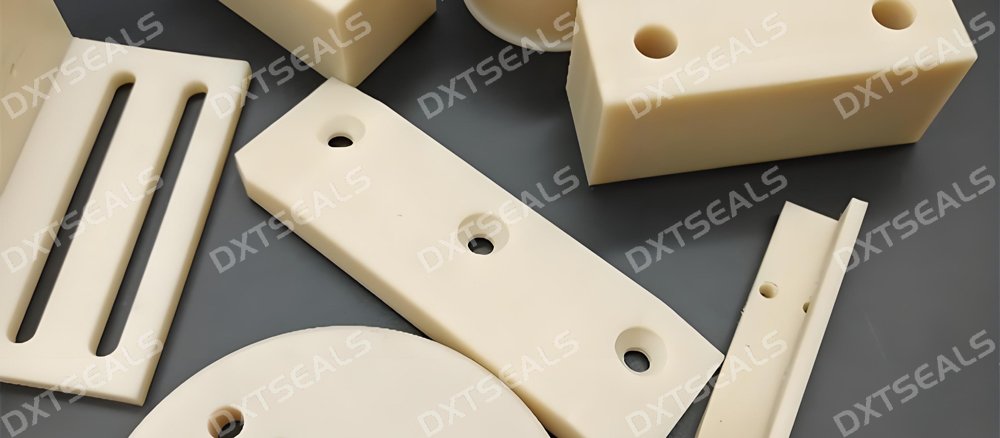
Choosing the right plastic material is critical to the performance, durability, and cost-efficiency of your product. With dozens of engineering plastics available, making an informed decision can be challenging.
At DXTSEALS, we help our clients navigate this complexity by offering expert guidance and high-quality custom plastic parts designed for your exact application.
In this guide, we break down the most commonly used plastic types and their key characteristics, so you can make smarter, faster material decisions.
🔍 Why Material Selection Matters
Different plastics offer different mechanical, thermal, and chemical properties. The wrong choice can lead to:
-
Premature part failure
-
Increased costs
-
Poor fit or finish
-
Regulatory non-compliance
Understanding material behavior is key to achieving optimal performance in any industry.
📋 Common Types of Plastic and Their Characteristics
🔸 1. ABS (Acrylonitrile Butadiene Styrene)
-
Strengths: Tough, impact-resistant, good surface finish
-
Limitations: Not UV resistant, lower chemical resistance
-
Applications: Enclosures, consumer goods, automotive trims
🔸 2. Nylon (PA, Polyamide)
-
Strengths: High tensile strength, wear-resistant, self-lubricating
-
Limitations: Absorbs moisture, not ideal for wet environments
-
Applications: Gears, bushings, machine components
🔸 3. PEEK (Polyether Ether Ketone)
-
Strengths: Excellent mechanical properties, chemical resistance, high-temperature tolerance (up to 250°C)
-
Limitations: Expensive, harder to machine
-
Applications: Aerospace, medical implants, semiconductor components
🔸 4. PTFE (Teflon®)
-
Strengths: Extremely low friction, chemical inertness, non-stick surface
-
Limitations: Low mechanical strength, difficult to bond
-
Applications: Seals, gaskets, chemical linings
🔸 5. Polypropylene (PP)
-
Strengths: Lightweight, fatigue-resistant, chemical-resistant
-
Limitations: Poor UV resistance, lower strength
-
Applications: Packaging, living hinges, laboratory containers
🔸 6. Polycarbonate (PC)
-
Strengths: Transparent, high impact resistance, heat resistant
-
Limitations: Scratches easily, sensitive to chemicals
-
Applications: Safety shields, lenses, electronic housings
🔸 7. UHMWPE (Ultra High Molecular Weight Polyethylene)
-
Strengths: Outstanding abrasion resistance, low friction
-
Limitations: Difficult to machine with precision
-
Applications: Conveyor components, wear strips, marine bearings
🏭 Where These Plastics Are Used
Each plastic type shines in different industrial applications:
| Industry | Best Materials | Typical Uses |
|---|---|---|
| Automotive | ABS, Nylon, PEEK | Gears, trims, fluid system parts |
| Aerospace | PEEK, PTFE | Insulation, seals, engine components |
| Medical | PEEK, PP | Implants, instruments, packaging |
| Food & Beverage | UHMWPE, PTFE | Conveyor parts, gaskets, linings |
| Electronics | PC, ABS, PTFE | Casings, connectors, insulators |
| Chemical Industry | PTFE, PP | Valves, tanks, fittings |
🛠 How DXTSEALS Helps You Choose the Right Plastic
At DXTSEALS, we don't just manufacture—we partner with our clients to optimize design and material choice from the start. Our team provides:
-
✔ Material consulting based on your application conditions
-
✔ In-house machining, molding, and prototyping
-
✔ Strict quality control for dimensional and material standards
-
✔ Fast sampling and low-volume production
We work with all major engineering plastics and can customize formulations to meet industry-specific needs, including FDA, RoHS, and REACH compliance.
📌 Conclusion: Choose Smarter, Perform Better
Understanding the types and properties of plastic materials empowers you to make strategic decisions that affect product life cycle, cost, and customer satisfaction.
Whether you're developing a new part or upgrading an existing one, DXTSEALS is your reliable partner for precision plastic components.
📞 Contact us today or explore www.dxtseals.com to start your next project with expert support and world-class quality.
DXTSEALS – Plastic Engineering Made Smarter.
